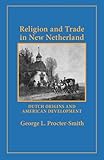Religion and Trade in New Netherland : Dutch Origins and American Development / George L. Procter-Smith.
Material type: TextPublisher: Ithaca, NY : Cornell University Press, [2018]Copyright date: ©2018Description: 1 online resource (282 p.)Content type:
TextPublisher: Ithaca, NY : Cornell University Press, [2018]Copyright date: ©2018Description: 1 online resource (282 p.)Content type: - 9781501718007
- 261 22
- BR555.N7 S62 2010
- online - DeGruyter
| Item type | Current library | Call number | URL | Status | Notes | Barcode | |
|---|---|---|---|---|---|---|---|
 eBook
eBook
|
Biblioteca "Angelicum" Pont. Univ. S.Tommaso d'Aquino Nuvola online | online - DeGruyter (Browse shelf(Opens below)) | Online access | Not for loan (Accesso limitato) | Accesso per gli utenti autorizzati / Access for authorized users | (dgr)9781501718007 |
Frontmatter -- Contents -- Preface -- 1. Introduction -- Part I. The Netherlands: The Church's Point of View -- 2. Church and State in Calvin's Theology -- 3. The Struggle over the Church Order and the Arminian Schism -- 4. The Problem of Dissent -- PART II. The Netherlands: The Merchants' Point of View -- 5. Amsterdam: The Center of a Dutch World Enterprise -- 6. Amsterdam's Attitude toward Religious Dissent -- 7. Church and State in Dutch Colonial Policy -- Part III. New Netherland, 1609-1647: Frustrations -- 8. Intentions and Frustrations -- 9. The Merchants -- 10. The Predikanten -- Part IV. New Netherland, 1647-1664: The Establishment Challenged -- 11. The Turning Point -- 12. The Lutherans -- 13. The Jews -- 14. The Left-Wing Dissidents -- 15. Conclusion: Connivance, the Dutch Colonial Contribution to American Religious Pluralism -- Bibliographical Essay -- Index
restricted access online access with authorization star
http://purl.org/coar/access_right/c_16ec
"The Dutch colony of New Netherland in the seventeenth century enjoyed a greater diversity of religious beliefs than any of the English colonies in America at the time, except possibly Rhode Island. George L. Procter-Smith has investigated the background and reasons for this religious diversity and toleration despite the legal establishment of the Dutch Reformed Church. All colonies have to be understood in terms of their mother country; but, Procter-Smith insists, the European background is especially important in the study of New Netherland. He devotes about half the book to the religious situation in the Netherlands and the de facto toleration that existed despite the state church."The Dutch colony in America was founded for trade, not for religious reasons which were so prominent in the neighboring English colonies. As the Dutch directors of the West India Company, the colony's proprietor, tried to recruit settlers, they realized that intolerance and religious persecution would keep many prospective settlers away. Consequently, they paid lip service to the Dutch Reformed establishment but in practice allowed dissenters to practice their religion in private. Procter-Smith has written a clear, persuasive account of religion and politics, as shaped by the Dutch trading interests, in both Europe and New Netherland."—Review for Religious: A Journal of Catholic Spirituality
Mode of access: Internet via World Wide Web.
In English.
Description based on online resource; title from PDF title page (publisher's Web site, viewed 26. Apr 2024)


